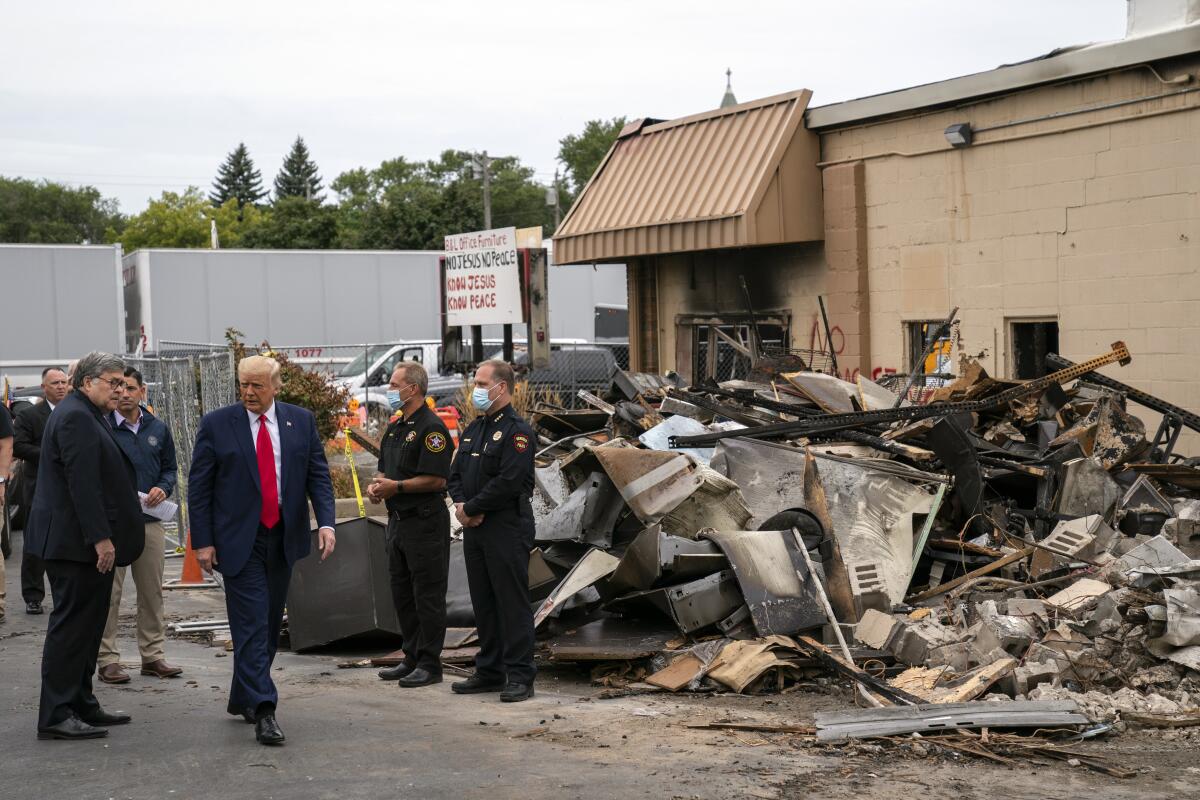Opinion: Are conservatives actually OK with Trump taking over local law enforcement?

- Share via
Once again, something President Trump is doing makes me wonder if Republicans are still the party of federalism and small government, or if they just think the powers reserved to the states vary, depending on whether they vote red or blue.
Trump issued an executive order Wednesday thrusting federal agencies even more deeply into local public safety issues, on the grounds that local elected officials weren’t doing enough to stop the sometimes violent and destructive protests against police brutality. He targeted four specific cities — Seattle, Portland, New York City and Washington, D.C. — for potential cutoff of federal funds on those grounds, writing, “My administration will not allow federal tax dollars to fund cities that allow themselves to deteriorate into lawless zones.”
Please point out what part of the Constitution or federal law gives the president the power to direct the vast amount of dollars that flow to cities based on whether they’re managing their crime problems the way the president wants them to.
And those four cities may just be the start. The order also calls on the attorney general to create within two weeks, then update every six months, “a list identifying State and local jurisdictions that have permitted violence and the destruction of property to persist and have refused to undertake reasonable measures to counteract these criminal activities (anarchist jurisdictions).” Meanwhile, the head of the White House’s Office of Management and Budget is supposed to advise federal agencies how to exclude or “disfavor” these cities when doling out grants, “to the maximum extent permitted by law.”
Insert the sound of brakes squealing here. Can you imagine Congress setting up a grant program for community development, housing or other local needs and giving the executive branch the discretion to bar cities that are beset by “anarchists”? If anything, you would think Congress would set criteria that favor cities with crime problems, not punish them.
But don’t expect this administration to take a conservative view of what the law allows a president to do. This is, after all, the same group that tried to cut off Community Oriented Policing Services grants to cities and states that did not want to take on duties best left to Immigration and Customs Enforcement officers. The effort was quickly blocked by a federal judge; three appeals courts have since ruled that the administration didn’t have the legal authority to cut off the grants, while one appeals court came to the opposite conclusion.
In those cases, at least, there’s a relationship between the behavior Trump was targeting and the purpose of the grants. But Trump’s order covers all the money the federal government sends to cities, which extend far beyond the realm of law enforcement.
What’s particularly appalling here is how unmoored Wednesday’s order is from federal law. For example, to decide what makes a city an “anarchist jurisdiction,” the attorney general is supposed to consider whether it limits local police tactics, cuts police budgets or powers, “unreasonably” refuses to accept an influx of federal law enforcement agents, and “any other factors the attorney general deems appropriate.”
Under what view of the Constitution and federal statutes is it appropriate for the attorney general to decide how a city manages its police? The Supreme Court has already made clear, as recently as in the Obamacare ruling in 2012, that there’s a limit to Washington’s power to coerce state and local governments into following its policy lead. If President Obama had ordered Atty. Gen. Eric Holder to choose which cities had “appropriate” law enforcement tactics and therefore should be eligible for Community Development Block Grants, how many Republicans in Congress would have screamed bloody murder?
Alan Berube, an expert on metropolitan policy at the Brookings Institute, said Congress typically lays out in “excruciating detail” who’s eligible for grants, how much money they can receive and what the money can be used for. And if those details aren’t in the law, they’re in the regulations federal agencies adopt to govern grant programs. Although these rules leave varying amount of discretion to the agencies, Berube said, “my sense is that none of them would permit the executive branch to withhold funding for the reasons specified in this executive order.”
His bottom line? “It’s a political act, not an act of governance.”
To be clear, there’s little to defend in how mayors in Portland, Minneapolis and other cities around the country stricken with unrest have handled the circumstances they confronted. There are plenty of failures of local leadership on display, and the consequences for many residents of those cities have been devastating.
This is yet another display of how poorly the “I alone can fix it” president accepts the limits of presidential power. And it’s hypocritical as well — Trump’s first attorney general, Jeff Sessions, declared that the Justice Department had lost interest in overseeing local police and sheriff’s departments. Sessions was retreating from the Justice Department’s well-established role responding to cops and deputies abusing civil rights; Trump is now asserting a new role for the Justice Department in determining whether cops and deputies are being kept on too tight a leash.
Yes, Republicans have long styled themselves as the party of law and order, and not always in a noble way. But the GOP is also supposed to be the party that stands against federal overreach. And what Trump did Wednesday is clearly an overreach.
More to Read
A cure for the common opinion
Get thought-provoking perspectives with our weekly newsletter.
You may occasionally receive promotional content from the Los Angeles Times.











